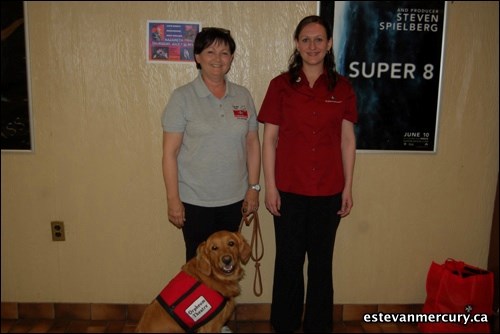Dee Armstrong and her dog, Kai, are Estevan's first therapy dog team, and the experience is a positive one -- both for Armstrong and for the people she and Kai visit. The team was present at a viewing of A Dog Named Christmas, put on by and hosted at the Orpheum Theatre, which also sponsors Armstrong and Kai.
The event was attended by people from Estevan Diversified Services and Creighton Lodge, two places in Estevan that Armstrong and Kai volunteer.
The film is about a mentally challenge young man who fosters out all the dogs in the humane society at Christmas, intending that none of them be alone. Kai had a small role in the film, which Armstrong described as "emotional."
St. John Ambulance's therapy dog program is intended to be a weekly service that involves a team, comprised of a handler and a dog, visiting seniors' homes, hospitals and other such centres in a community. The program is also involved in schools, focusing on structured learning programs and students with disabilities. The program, according to Armstrong, brings love and lack of judgment offered by a dog into these centres.
"[Dogs] just sense what people need," she said.
Armstrong and Kai, her two-year-old female golden retriever, have been Estevan's soul dog therapy team since they were certified in October 2010, and Armstrong said the effects are often obvious and sometimes immediate, citing examples of people who made eye contact with, or called out to Kai despite being often unresponsive or withdrawn around people.
"Kai is certified to work with children," said Armstrong, though the team has yet to work with kids. "I can see her being helpful with victims of abuse. She can calm them down."
Amanda Kish, director of community services for St. John Ambulance, spoke of an initial visit wherein a team went into a difficult class of all boys. The entire class responded well to the dog, and by the end of the visit they were walking the dog around the classroom.
"The teachers were so surprised and shocked by how the boys took to the dog," said Kish, explaining how dogs can reach both children and adults in a way that humans sometimes cannot.
Armstrong explained that dogs are perfect for people who are lonely, without family, depressed, or unable to communicate.
It was Armstrong's love of dogs that got her interested in the program.
"I have wanted to do this for a very long time," she said.
Armstrong contacted St. John Ambulance after doing some research and worked to get Kai and herself certified.
"You do your own training," explained Armstrong. "Then go through testing to be certified. A team is certified to work with adults first, and then children later."
The testing evaluates how the dogs behave in care homes and around wheelchairs, among other scenarios.
"Sometimes we drop a metal pot around the team, to see how they react," said Kish.
Temperament is more important than breed, and handlers are evaluated on how well they can control their dogs. Handlers, who need to be 18 years of age or older, must also provide references and pass a criminal check, and dogs must have all required shots. Also, first visits with new clients are always shadowed, either by Kish or one of the program's other evaluators.
"The people who want to volunteer for this program are usually the right kind of people. It's the dogs that we're really testing," said Kish.
Clearly the program is doing well; there are currently 105 teams operating in Saskatchewan, with the majority of them located in Regina and Saskatoon. However, Kish pointed out that there has been growth in smaller centres and rural areas, thanks to teams like Armstrong and Kai. There is also a growing demand for therapy teams that work with children, particularly in Regina.
"Handlers tell me that their dogs know they're going to work when they put their cape on," said Kish.
Both Kish and Armstrong describe the experience as rewarding.
"All of the things I see happening with clients, it's just amazing. It has a huge impact on people's lives," said Armstrong. "I enjoy getting to share my dog."




